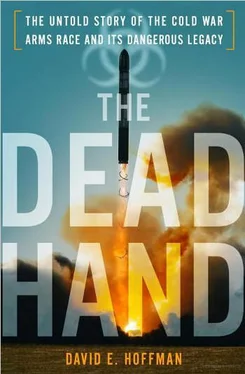A few days later, on July 18, former president Richard Nixon held a private talk with Gorbachev in Moscow. Gorbachev told Nixon he wanted to send a signal to Reagan: he was eager to move ahead, he would not seek to postpone action until Reagan left office. “In today’s tense atmosphere, it means we cannot afford to wait,” Gorbachev said. Nixon reinforced the idea, saying Reagan was also primed to move. Nixon transmitted the message to Reagan, writing up a twenty-six-page memo for the president on his return.
On July 25, Reagan sent Gorbachev a seven-page formal letter, an outgrowth of the meeting at which Weinberger had proposed eliminating all ballistic missiles. The language of the Reagan letter was convoluted. It proposed that either the United States or the Soviet Union could research missile defense, and if they succeeded in creating it, would share, but only if both sides also agreed on a radical idea: “eliminate the offensive ballistic missiles of both sides.” If they didn’t agree to share-and-eliminate, then either side could, after six months, build missile defense on its own. Thus, Reagan had taken his dream of missile defense and hammered it together with Weinberger’s improbable proposal to get rid of the missiles.
On testing, Reagan firmly refused to stop.
On August 18, Gorbachev once again extended the Soviet nuclear-testing moratorium. Velikhov’s efforts had paid off. But Gorbachev was restless. When he went on vacation at the end of the month, Gorbachev was accompanied by Chernyaev, his national security adviser, as a one-man staff. They sat on the veranda or in Gorbachev’s office before lunch, reviewed the cables and made telephone calls to Moscow. Gorbachev asked the Foreign Ministry to provide an outline of ideas for the next meeting with Reagan. When the document came from Moscow, the suggestions were dry repetitions of what had been offered at the stalled arms control negotiations in Geneva.
Gorbachev threw it on the table. “What do you think?” he asked Chernyaev.
“It’s no good,” Chernyaev replied.
“Simply crap!” Gorbachev said.
Gorbachev asked Chernyaev to draft a letter to Reagan inviting him to a summit very soon, suggesting one venue might be Reykjavik, the capital of Iceland, perhaps in September or October. When Chernyaev asked why Reykjavik, Gorbachev said, “It’s a good idea. Halfway between us and them, and none of the big powers will be offended.” 56Shevardnadze subsequently took the invitation to Washington on September 19. In the letter, Gorbachev offered a choice of London or Iceland; Reagan agreed to Iceland. The letter proposed “a quick one-on-one meeting… maybe just for one day, to engage in a strictly confidential, private and frank discussion (possibly only with our foreign ministers present).” 57Gorbachev said the talk “would not be a detailed one,” but designed to prepare a few issues for a later summit agreement. Reagan wrote in his diary, “This would be preparatory to a Summit.” 58
But what was going through Gorbachev’s mind was something far more ambitious. He began to plan for a grand overture. He wanted to move very far, and fast. In their private discussion and memos, Gorbachev and Chernyaev plotted a dramatic turning point in the arms race. The summit must bring “major, sweeping proposals” to the fore, Chernyaev wrote. On September 22, Gorbachev told the Politburo he was willing to consider releasing twenty-five dissidents on a list demanded by Reagan, a move to assuage the president. 59In early October, a paper on the summit came to Gorbachev from Akhromeyev and others, offering guidelines for what Gorbachev should do. Gorbachev rejected it; he wanted to be bolder. 60Chernyaev offered his views to Gorbachev, which captured the mood: “The main goal of Reykjavik, if I understood you correctly in the South, is to sweep Reagan off his feet by our bold, even ‘risky’ approach to the central problems of world politics.” 61Chernyaev urged Gorbachev to make strategic weapons—missiles, bombers, submarines—his main topic, seeking a 50 percent reduction. Gorbachev agreed on the need for sweeping change, but did not want to get bogged down in arithmetic. “Our main goal now is to prevent the arms race from entering a new stage,” he said. “If we don’t do that, the danger to us will increase. If we don’t back down on some specific, maybe important issues, if we don’t budge from the positions we’ve held for a long time, we will lose in the end. We will be drawn into an arms race that we cannot manage. We will lose, because right now we are at the end of our tether.”
By contrast, Reagan approached the Reykjavik meeting casually, without any of the careful study he had applied before Geneva. There was no precooked agenda, as in previous summits. The Americans had little inkling of what Gorbachev was planning. Shultz wrote Reagan on October 2 that arms control would be central, but the Soviets “are largely talking from our script.” A Soviet specialist at the State Department wrote a two-page memo that opened: “We go into Reykjavik next week with very little knowledge of how Gorbachev intends to use the meeting.” Poindexter wrote “talking points” that he gave to Reagan, including “anticipate no substantive agreements per se,” and “meeting is in no sense a substitute or a surrogate for a summit.” 62
But in Moscow, in his instructions to his summit aides October 4, Gorbachev was once again clear and direct about his ambitions—they were sky high. He talked about finding something to offer Reagan with “breakthrough potential,” and at the top of Gorbachev’s list was “the liquidation of nuclear weapons.” As a more immediate goal, he wanted to be rid of the arms race in European missiles, to remove the threat of the fast-flying Pershing Ils. “In our mind we must hold the priority task to kick the Pershing Ils out of Europe,” he said. “This is a gun at our temple.”
Gorbachev mentioned “liquidation of nuclear weapons” repeatedly.
He also told the aides he had a strategy. He would push for bold achievements, and “if Reagan does not meet us halfway, we will tell the whole world about this. That’s the plan.”
“If we fail, then we can say—Look, here’s what we are prepared to do!”
———
Reagan and Gorbachev met at Hofdi House, an isolated, two-story white structure overlooking the bay with a reputation for being haunted—it had been sold by the British ambassador in 1952 after pictures kept falling inexplicably off the walls. The North Atlantic weather cast cold, driving rain squalls—and brief splashes of brilliant sunshine—across the city on Saturday, October 11. Reagan and Gorbachev met at 10:40 A.M., sitting in brown leather armchairs opposite a small table in a room on the first floor, with a window on the gray and turbulent sea just beyond, and, on another wall, a dark blue oil painting, a seascape of waves crashing onto the rocks. In their initial meeting alone, Reagan repeated his favorite Russian proverb, “trust, but verify,” and Gorbachev wasted no time telling Reagan that the arms negotiations were stalled and they needed to give them an “impulse.” Suddenly, there was an awkward moment. Reagan dropped his note cards. Gorbachev deflected the embarrassment by suggesting they invite their foreign ministers to join them; Shultz and Shevardnadze entered the room. Shultz remembered the scene: “Gorbachev was brisk, impatient and confident, with the air of a man who is setting the agenda and taking charge of the meeting. Ronald Reagan was relaxed, disarming in a pensive way, and with an easy manner.”
Gorbachev launched into his dramatic proposals right at the outset. He proposed a 50 percent reduction in what he called “strategic offensive arms,” a very broad definition that could cover many weapons. He pledged the Soviets would accept deep cuts in the giant land-based missiles. He proposed to eliminate all medium-range missiles in Europe, including the Pioneers and the Pershing IIs. He called for “full and final prohibition of nuclear testing.” Gorbachev proposed that both sides promise for ten years to stick by the 1972 Anti-ballistic Missile Treaty. This would put restraints on Reagan’s dream: research on missile defense would have to be confined to the laboratory. 63
Читать дальше












